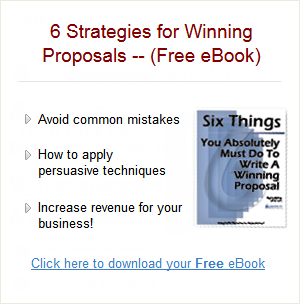Who Are Your Readers and What Do They Look For?
Most proposals are evaluated by more than one person. Even in the case of letter proposals you write for a customer who has asked you informally for a quick scope of work, a timeline and a cost estimate, the final decision to hire your firm will likely be left to someone at a higher level in the organization.
In their book Strategic Selling, authors Robert Miller and Stephen Heiman identify four categories of evaluators or “roles” they play in the buying process. These are:
- Economic Buyers
- User Buyers
- Technical Buyers
- Champions
Economic Buyers. These people are the “money” people in the customer’s firm or agency. They control the budget and have veto power over any decision requiring spending. They will be taking a hard look at the return on investment the purchase has. These people are also more inclined to say no to a proposal than yes.
| It’s critical that you make sure your proposal addresses the needs and concerns of all those who have a say in evaluating your proposal. |
Their bottom line: What will be the overall performance improvement and return on this investment?
User Buyers. These people are the ones who will ultimately use whatever it is you offer. If they have a vote (and they often will on IT-based procurements) then you need to pay very specific attention to their needs, and make sure you address them.
These people are pretty sensitive; they often believe (justifiably) that management buys stuff they will have to use that will not really meet their needs. Their natural inclination will be to be very suspicious of what you’re offering, because they have been handed useless stuff in the past.
Their bottom line: How will the project affect my job and those I manage?
Technical Buyers. These people don’t always have a vote, but they certainly have influence. They will measure your technical solution against a set of requirements and specifications. You must make sure that your solution passes muster with them or they will make sure your proposal goes no further.
Their natural inclination is to be skeptical that your solution will work; they are the technical hotshots in the company and you have to prove to them that you can meet their standards.
Their bottom line: How well does the proposal meet the technical specifications?
Champions. These are people you want to sniff out. A champion is someone in your customer’s firm who will help you learn about the ins and outs of the firm, the hot buttons and the fears, and will help you navigate the uncharted waters. Champions are cultivated; you have to be on the lookout for them. They are also your best assets when selling to a firm.
Their natural inclination is to support you all the way and to help you win the job, providing you keep in mind what’s in it for them.
Remember this about champions–they are made, not born. In other words, you have to cultivate a champion; no one’s going to take up your cause just because they feel generous. And one more thing: chances are at least one of your competitors have a champion in the customer’s shop.
Their bottom line: They want you to win, and will do what they can to help.
I’ve said it before, but I’ll say it again (and again, and again): Know who your readers are, give them what is important to them, and hit on benefits, benefits, benefits.

